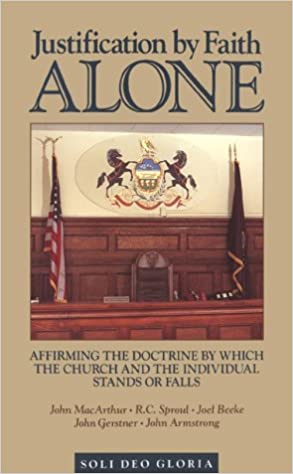A Brief Chapter Summary from Books At a Glance
By Chris Bolt
Summary
Current confusion about justification by faith alone illustrates an evangelical tendency to move away from a defining mark of Protestantism and closer to Roman Catholicism. In his 1521 German New Testament, Martin Luther translated Romans 3:28 to include the word “alone” following the word “faith,” igniting no small amount of controversy. Yet, other Reformers clearly followed his lead in understanding justification by faith as justification by faith alone. Faith may be defined as trust or reliance on another. Christ is the only ‘another’ we are to trust, and we do so entirely. This faith is in no way meritorious. Even this faith is a result of the gift of God’s grace, and should not be confused with sanctification. Justification has a legal aspect that ensures we understand ourselves as once and for all declared righteous in God’s sight as his adopted children.
The doctrine of sola fide, or faith alone, does not stem merely from Luther’s psychological state in medieval scholasticism, but from the teaching of Paul in his letters to the Romans and the Galatians. Luther simply brought this clear teaching of Scripture out to the light. Luther’s contention was that adding the word “alone” to Romans 3:28 in his German New Testament was necessary in order to emphasize the point of the original Greek. The apostle Paul makes his appeal to Genesis 15:6 in Romans 4:3-5 with the effect that the faith of Abraham must be read as to righteousness, not instead of or opposed to righteousness.
The antithesis in Romans 4:3-5 is between the person who works and the person who believes. The person who believes is justified through (Romans 3:25), by (3:28), and out of (3:30) faith. The use of these aforementioned prepositions clarifies that faith is instrumental in the appropriation of the righteousness of Christ, not a ground or meritorious work of justification. Faith merely channels justification apart from works, ensuring that salvation is also by grace alone. The righteousness God provides is enjoyed through trustful reliance upon God, as Paul notes by appealing to Habbakuk 2:4 in Romans 1:17. This righteousness is external to man, imputed to those who believe. Faith must be alone, or it is not faith. . . .
[To continue reading this summary, please see below....]The remainder of this article is premium content. Become a member to continue reading.
Already have an account? Sign In
Buy the books

JUSTIFICATION BY FAITH ALONE: AFFIRMING THE DOCTRINE BY WHICH THE CHURCH AND THE INDIVIDUAL STANDS OR FALLS, by John MacArthur, R. C. Sproul, Joel Beeke, John Gerstner, John Armstrong